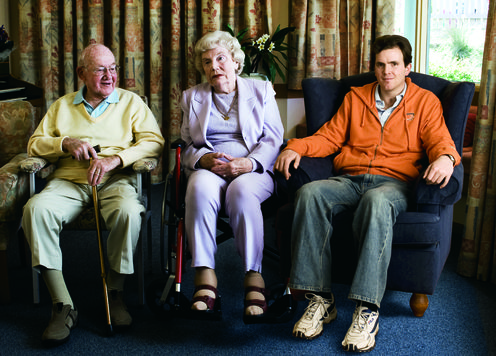
More than 7,000 young Australians with disabilities are forced to live in nursing homes because they’re unable to find suitable accommodation that meets their needs. But this may be about to change. A Senate Inquiry report, tabled yesterday in federal parliament, has set a 2018 deadline to ensure these residents can move into appropriate housing.
The report identifies 12 key recommendations, one of which is the urgent need to prevent new admissions of young people into nursing homes. Once young people move into nursing homes it’s hard to get them out. They lose skills and their social connections.
Take 44-year-old Gordon Irvine, for instance. Gordon made significant progress during four weeks of rehabilitation after his brain injury and was able to walk with a frame when he was first admitted to a nursing home. After living in a nursing home, however, he was unable to stand unassisted.
Nursing homes are not set up or resourced to facilitate the independence of younger residents. As Gordon said:
I feel like less of a human being, as I can no longer do the things I used to be able to do.
Many young people (59%) are admitted to an acute or rehabilitation hospital before their first admission to a nursing home. So it’s critical that state disability services and the National Disability Insurance Scheme (NDIS) collaborate with the health system to prevent young people moving from hospitals to nursing homes.
Many people at risk of admission to residential aged care facilities are not eligible or suited to existing rehabilitation services in Australia. They need slow stream rehabilitation which allows a more extended time frame to achieve small but functionally significant gains.
While there are pockets of excellent transitional and slow stream rehabilitation services throughout Australia, the Senate report recommends the development and implementation of a national rehabilitation strategy.
The Senate Inquiry report outlines a range of practical recommendations related to assessment, information, advocacy and a national rehabilitation strategy that together will go a long way to prevent new admissions of young people to nursing homes. The report also recommends the establishment of a joint taskforce to ensure these recommendations are coordinated across all levels of government.
The report recognises that the NDIS alone cannot solve the issue of young people in nursing homes in Australia. The NDIS is an ambitious reform, and is poised to transform the lives of hundreds of thousands of people with disability to support them to work. However, most young people will not move out of nursing homes as a result of the NDIS because there are not enough places to move to.
Australia desperately needs more housing that is both accessible and affordable. Many young people in nursing homes (46%) are in partner relationships and 27% are parents of school age children, so a range of housing options including options for people to live with their partner and/or children is needed.
We don’t need any more group homes in Australia. Given the choice, many people with disability would move to more individualised housing and support options. This would create vacancies in group homes for people who either choose to live in a group setting or require an intensive level of support.
The Summer Foundation, the organisation I lead that is dedicated to getting young people out of nursing homes, has developed a housing demonstration project to show how this can work.
The project consists of six apartments for people with high support needs peppered throughout a larger mixed private and social housing development. The housing is centrally located and within 500 metres of a train station and shops, to maximise independence and inclusion and minimise transport costs and reliance on paid supports.
Residents can use an iPad or smart phone to control lighting, heating, cooling, blinds, door bells and doors, as well as to contact support staff. This technology means they have greater independence and privacy, while still having access to 24-hour on-call support if they have an urgent need for unplanned support or an emergency.
We’re also developing a second housing demonstration project in the Hunter NSW NDIS trial site.
Housing for people with disability must be incorporated into mainstream housing strategy instead of continuing to build segregated and specialist housing – this will create the scale and range of housing options we need.
I hope the Senate Inquiry report will herald the renewal of strong government policy leadership, and ensure effective collaboration across the health, housing and aged care sectors. No one sector has the expertise or resources to resolve the issue of young people in nursing homes in Australia on its own.
Dr Di Winkler is the CEO and Founder of the Summer Foundation
